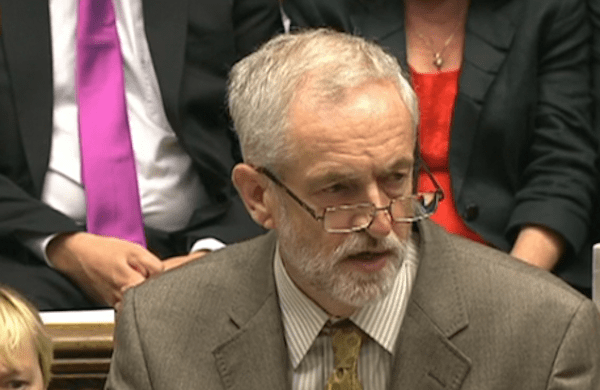Jezza! What a genius. The master plan is clear at last. You spend four days plumbing new depths of political incompetence with bungled cabinet appointments, surly refusals to talk to reporters, tedious waffly platform-speeches and grumpy scowls during a service at St Pauls. And then, when your reputation can dwindle no lower, you spring forth and dazzle everyone with a political revolution.
Cameron was grinning sheepishly before the Labour leader rose to the despatch box. He smirked sideways at his new opponent, through half-closed eyes, like a shy girl about to enter a forced marriage.
Corbs looked relaxed and far sprucer than before. He might have been a civics teacher arriving for Day One at the new comp. Shiny grey tunic, off-white striped shirt, green splotchy tie. The colours had been carefully mis-matched to remind us that the people’s champion is too busy championing the people to worry about matching his colours.
After a boring half-minute congratulating himself on his victory, Corbs began his revolution. Parliament, he said, was perceived to be too ‘theatrical’ and ‘out of touch’. And the citizens were denied a chance to speak. So he offered himself as the people’s ventriloquist. He said he’d received 40,000 questions by email which he wanted to ask the PM. He gave the authors’ names. Marie, Steven, Paul, Clare, Gayle and Angela. (OK, OK, female majority duly noted.).
Cameron welcomed the new approach. Or claimed he did. The first question, from ‘Marie’, was about affordable homes. Cameron assured ‘Marie’ that ‘260,000 new units’ had been built. Then Corbs moved politely to a question from ‘Steven’ about housing associations. The despatch-box suits Corbs far better than the mass-rally. His quiet, forceful courtesy came across extremely well. But the charm of the new approach began to fade during Cameron’s reply to ‘Steven’. Murmurings began. Chit-chat shimmered across the government benches. Members turned and whispered in each other’s ears. On question three, about welfare cuts, Cameron heard a voice bellowing abuse at him from the Labour side. He stopped dead, held up his hands in despair and threw a petulant smirk at his backbenchers.
‘Sorry!? I thought this was the new question time. I’m not sure the message has fully got home.’
Then he said. ‘I don’t want to blind the house with statistics but’ …
And he recited four statistics.
The new politics looks like the old politics but with a dash of sanctimony.
The SNP’s Angus Robertson asked why the government hadn’t devolved powers to Scotland as promised. We have, said, Cameron, but the SNP won’t use them.
‘Are you frit?’ he needled.
‘Very interesting,’ mused Robertson from his high horse. ‘What happened to the new prime minister’s questions?’
It took Nigel Dodds to bring the chamber back to its cosy, shouty old ways. Referring to John McDonnell, the new shadow chancellor, Dodds asked Cameron to respond to those who apologise for terror.
Cameron’s reply was surprisingly personal. He named Airey Neave (murdered by the INLA) who had once been his MP. And he mentioned Ian Gow (murdered by the IRA) who was among the first parliamentarians he had worked with.
‘That terror was wrong, it was never justified and those who seek to justify it should be ashamed of themselves.’
The house roared like a thunderstorm. The new approach had lasted barely half an hour. Or perhaps it had never begun. Corbyn’s ‘sock-puppet-of-the-people’ routine was as carefully planned as any new Labour initiative. As was Cameron’s response.
He might have come out in full battle-order today and hammered Corbyn with his policies on NATO, nukes, tax-hikes and union regulation. But he kept his weapons holstered. That too was the old politics.







Comments